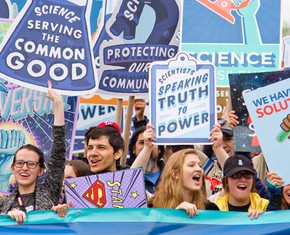The views expressed in our content reflect individual perspectives and do not represent the authoritative views of the Baha'i Faith.
Do we humans have a fundamental right to a livable climate? No—not yet, at least not in strictly legal terms. But that may be coming soon!
A potential change in the law now looms, due to many legal challenges in court, including the young people’s climate change case against the United States federal government. You may have already heard about this case, in which a group of 21 youth represented by a non-profit organization named Our Children’s Trust have sued the United States government on behalf of future generations of children, asserting that access to a clean environment is a fundamental human right.
Here’s the legal citation: Juliana v. United States, 217 F. Supp. 3d 1224 (D. Or. 2016). This landmark case bears watching, because it could change everything.
In fact, this case is part of a global legal trend. In June 2015, in the world’s first climate liability lawsuit brought under human rights and tort law, a Dutch court ordered the nation to reduce emissions by 25% over five years to protect its citizens from the future effects of climate change. Similar lawsuits have been brought in other countries, including New Zealand and Belgium, and have been won in Austria, Pakistan and South Africa. As of mid-2018, more than a thousand such suits have been filed in 24 countries.

Earth Guardians Youth Director Xiuhtezcatl Martinez, (his first name pronounced ‘Shoe-Tez-Caht’) is a 16-year-old indigenous climate activist, hip-hop artist, and powerful voice on the front lines of a global youth-led environmental movement.
In 2015, several youth—Aji Piper, Levi Draheim, Journey Zephier, Jayden Foytlin, Miko Vergun, and Nathan Baring—filed their constitutional climate lawsuit against the American government in the U.S. District Court for the District of Oregon. These individual plaintiffs were joined by an environmental group called Earth Guardians as an organizational plaintiff in the case. Their suit asserts that the U.S. government—through affirmative actions that cause substantial climate change—has violated this generation of youth’s constitutional rights to life, liberty, and property, as well as having failed to protect essential public trust resources. Along with the U.S. government, the fossil fuel industry initially intervened in the case as additional defendants.
On January 10, 2018, an Affidavit in support of the plaintiffs in this case was sworn, then later filed as part of the court proceedings. This Affidavit is a statement by Kenneth E. Bowers, member and Secretary of the National Spiritual Assembly (“NSA”) of the Baha’is of the United States, the democratically-elected governing council responsible for organizing and guiding the American Baha’i community. As Secretary, Mr. Bowers is the primary day-to-day operating officer of the NSA. In his sworn Affidavit, Mr. Bowers wrote, in part:
The Baha’i community has been addressing environmental issues and, more specifically, climate change for several years. It has worked for more than two decades to contribute to discourses on issues related to the environment.
As evidenced in the findings in Volume I of the U.S. National Climate Assessment released on November 3, 2017, the impacts of carbon pollution continue to increase as average global temperatures, extreme weather events, and global sea levels continue to rise. The impacts span across all regions and sectors of the U.S. economy, and the projected impacts from doing little about our emissions are severe, especially for our current youth and children as the next century approaches. To protect our children, the situation calls for the recognition of a fundamental right to a stable climate system that should be protected rather than violated by governmental action.
In the Affidavit, Bowers briefly highlights the Baha’i contribution to public discourse on the threat of climate change:
Baha’is are guided by a firm belief in the principle of the oneness of humankind, which has profound implications for policy. Baha’is believe that a recognition of this principle leads naturally to an acknowledgement of the organic interrelatedness and interdependence of all of the people of the planet regardless of nationality, race, sex, class, religion, or age. No one is unimportant. Ultimately, the best interests of the entire human family can best be served by assuring the welfare of each component part. Justice therefore requires that the interests of the marginalized or the powerless, whether the poor or the young, must be protected. Within the context of climate change, this means that significant reductions in our carbon emissions must occur so as to reduce the projected weather and pollution burdens we have unfairly shifted onto the poor, the young, and future generations. They and all of us are entitled, “as fundamental to a free and ordered society,” as Judge Aiken held at the District Court level, “to a climate system capable of sustaining human life.”
The statement by Judge Aiken that Bowers quotes comes from her published opinion in the case:
Exercising my “reasoned judgment,” … I have no doubt that the right to a climate system capable of sustaining human life is fundamental to a free and ordered society. Just as marriage is the “foundation of the family,” a stable climate system is quite literally the foundation “of society, without which there would be neither civilization nor progress.” …
Defendants and intervenors contend plaintiffs are asserting a right to be free from pollution or climate change, and that courts have consistently rejected attempts to define such rights as fundamental. Defendants and intervenors mischaracterize the right plaintiffs assert. Plaintiffs do not object to the government’s role in producing any pollution or in causing any climate change; rather, they assert the government has caused pollution and climate change on a catastrophic level, and that if the government’s actions continue unchecked, they will permanently and irreversibly damage plaintiffs’ property, their economic livelihood, their recreational opportunities, their health, and ultimately their (and their children’s) ability to live long, healthy lives. … plaintiffs allege a stable climate system is a necessary condition to exercising other rights to life, liberty, and property.
… In this opinion, this Court simply holds that where a complaint alleges governmental action is affirmatively and substantially damaging the climate system in a way that will cause human deaths, shorten human lifespans, result in widespread damage to property, threaten human food sources, and dramatically alter the planet’s ecosystem, it states a claim for a due process violation. To hold otherwise would be to say that the Constitution affords no protection against a government’s knowing decision to poison the air its citizens breathe or the water its citizens drink. Plaintiffs have adequately alleged infringement of a fundamental right. – Juliana v. United States, 217 F. Supp. 3d 1224, 1249–50 (D. Or. 2016) (internal citations omitted).
Further in his Affidavit, Bowers quotes Baha’u’llah, the prophet and founder of the Baha’i Faith:
… whatever I behold I readily discover that it maketh [God] known unto me, and it remindeth me of Thy signs, and of Thy tokens, and of Thy testimonies. By Thy glory! Every time I lift up mine eyes unto Thy heaven, I call to mind Thy highness and Thy loftiness, and Thine incomparable glory and greatness; and every time I turn my gaze to Thine earth, I am made to recognize the evidences of Thy power and the tokens of Thy bounty. And when I behold the sea, I find that it speaketh to me of Thy majesty, and of the potency of Thy might, and of Thy sovereignty and Thy grandeur. And at whatever time I contemplate the mountains, I am led to discover the ensigns of Thy victory and the standards of Thine omnipotence. – Baha’u’llah, Prayers and Meditations, pp. 271–272.
In the Affidavit, Bowers then cites these statements by Baha’u’llah:
Nature in its essence is the embodiment of My Name, the Maker, the Creator. … Say: Nature in its essence is the embodiment of My Name, the Maker, the Creator. … Nature is God’s Will and is its expression in and through the contingent world. It is a dispensation of Providence ordained by the Ordainer, the All-Wise. – Baha’u’llah, Tablets of Baha’u’llah, p. 142.
The civilization, so often vaunted by the learned exponents of arts and sciences, will, if allowed to overleap the bounds of moderation, bring great evil upon men. Thus warneth you He Who is the All-Knowing. If carried to excess, civilization will prove as prolific a source of evil as it had been of goodness when kept within the restraints of moderation. – Baha’u’llah, Gleanings from the Writings of Baha’u’llah, pp. 342–343.
Mr. Bowers concludes his Affidavit with the following statement:
We need informed, well-designed national policies, reflective of a fundamental right to a livable climate system, that will propel us, especially our children, toward a safe future.
















Comments
Sign in or create an account
Continue with Googleor